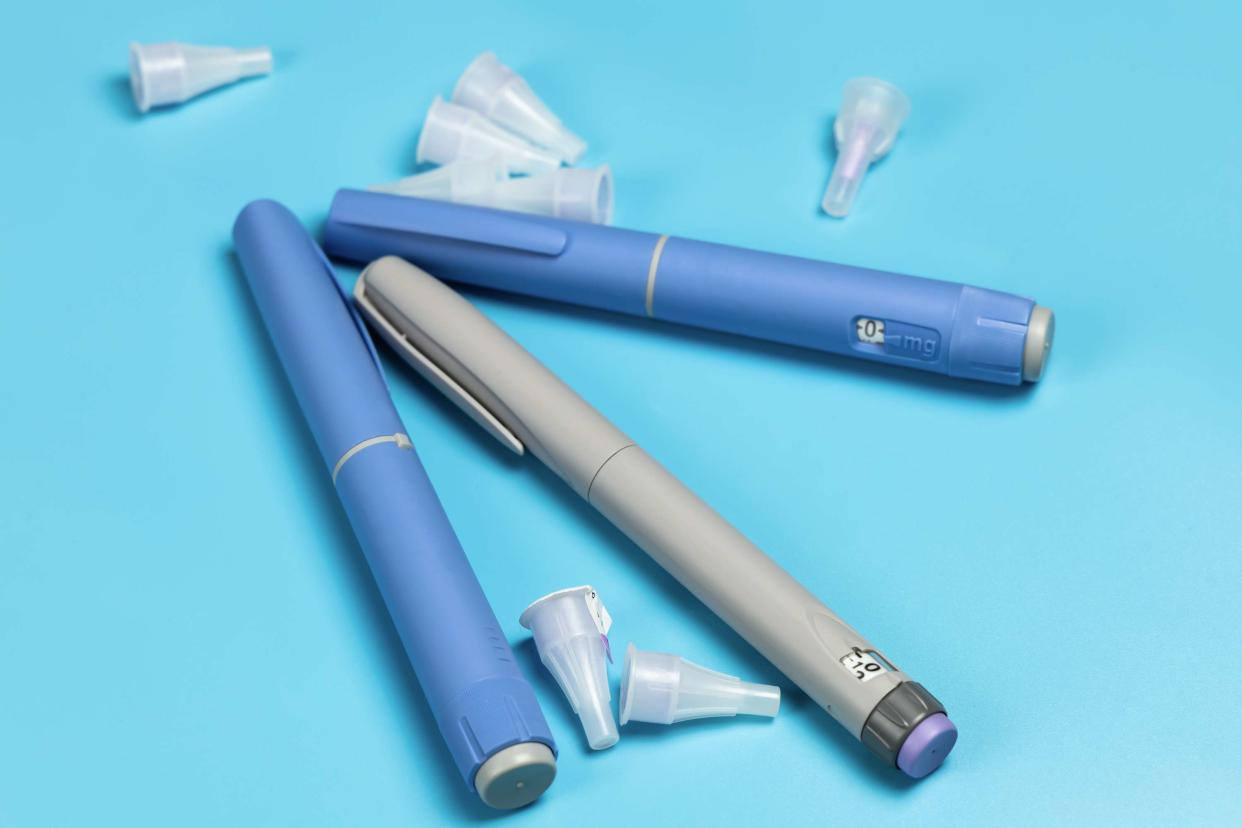The FDA Is Investigating Potentially Serious Side Effects of Weight Loss Drugs

Carolina Rudah/Getty
Fact checked by Nick Blackmer
Key Takeaways
The Food and Drug Administration (FDA) is investigating the potentially serious side effects of GLP-1 receptor agonists, which have become popular weight loss drugs.
The severe side effects were reported to the FDA’s FAERS system.
If the investigation shows that the weight loss drugs carry the risk for severe side effects, it may lead to a label change.
The Food and Drug Administration (FDA) is investigating reports of serious side effects from GLP-1 receptor agonists, such as Ozempic and Wegovy, that have come through its Adverse Event Reporting System (FAERS). There have been reports of side effects like hair loss, aspiration, and suicidal ideation that may be connected to the medications.
While investigations are ongoing, the FDA says that preliminary evaluations have not found evidence that the drugs cause suicidal thoughts or actions beyond a "small number" of instances.
How concerned do users of the popular diabetes and obesity medications need to be? Here’s what experts say.
Related: Ozempic vs. Wegovy vs. Mounjaro: What's the Difference?
Who Is Reporting Side Effects?
The FAERS database lets patients and health care providers report side effects to any medication, not just GLP-1 agonists. It’s important to know upfront that just because a side effect appears in the database does not mean it’s an actual side effect—it just means it’s a potential side effect.
The FDA’s new report from FAERS includes data that was collected between July and September that identifies medications with a “potential signal of a serious risk.” There’s no hard number of reports that have to be made for the FDA to investigate. According to the press release, “potential signals of serious risks are normally based upon a collection of FAERS reports, although a single FAERS report could lead to further evaluation of a potential safety issue.”
Which Drugs Are Included?
In the report, the FDA calls out the following GLP-1 receptor agonists as having newly identified and potential serious side effects:
Adlyxin (lixisenatide)
Byetta (exenatide)
Bydureon (exenatide)
Bydureon BCise (exenatide)
Mounjaro (tirzepatide)
Ozempic (semaglutide)
Rybelsus (semaglutide)
Saxenda (liraglutide)
Soliqua 100/33 (insulin glargine and lixisenatide)
Trulicity (dulaglutide)
Victoza (liraglutide)
Wegovy (semaglutide)
Xultophy 100/3.6 (insulin degludec and liraglutide)
Zepbound (tirzepatide)
According to the FDA, these GLP-1 receptor agonists may be linked with alopecia (hair loss), aspiration (when something that is swallowed, like liquid, gets in the airway), and suicidal ideation (thinking about or planning suicide).
For all three potential side effects, the FDA said that the organization is evaluating the need for regulatory action. According to the report, the FDA “is not suggesting that healthcare providers should not prescribe the drug or that patients taking the drug should stop taking the medication while an evaluation of the potential safety issue is being conducted.”
While the investigation is underway, the FDA said that patients who are concerned about the reports should talk with their prescribing providers.
Related: How to Keep Taking Mounjaro or Ozempic When You Can't Afford It
How Legitimate Are These Risks?
The FDA stresses that the reports of side effects in people taking these medications do not mean that the side effects are definitely being caused by—or are even related to—the medications. For example, a patient could have reported a side effect that they believed was from a weight management medication they’re taking, but it was really linked to a different drug, or not related to a medication at all.
“These drugs are safe,” Michael Russo, MD, a board-certified bariatric surgeon at MemorialCare Surgical Weight Loss Center at Orange Coast Medical Center, told Verywell. “However, we need to know what all the potential risks associated with them are. The drugs are fairly new to the market, so any information we have on them is great.”
Anecdotally in practice, providers have found that many patients do well on GLP-1 receptor agonists. “I prescribe these medications regularly and I’ve found them to be safe,” said Russo.
FAERS is a “useful tool” to look at concerns about drugs, Dina Peralta-Reich, MD, the director of New York Weight Wellness Medicine, told Verywell. The report is more of a potential signal than the final word, since “anybody can send a report to the FAERS. This is not something that is verified—it’s just reports that are made,” she said.
At the same time, the FAERS reports should not be dismissed.
“It is something we should take seriously,” Jamie Alan, PhD, an associate professor of pharmacology and toxicology at Michigan State University, told Verywell.
A spokesperson for the FDA did not respond to Verywell’s request for comment.
Related: What Happens to Your Body When You Stop Taking Ozempic?
What Happens Next?
The FDA will conduct an investigation into the reported side effects to look for evidence that links them to GLP-1 receptor agonists. If it’s discovered that the serious side effects are from the medications, it would likely lead to a labeling change for drugs, Christoph Buettner, MD, PhD, chief of the division of endocrinology at Rutgers Robert Wood Johnson Medical School, told Verywell.
If the side effects are proven to be a potential concern with GLP-1 receptor agonists, Buettner said that healthcare providers will need to be aware and need to monitor patients carefully while they’re being treated.
What This Means for You
If you take a GLP-1 receptor agonist and you have side effects that concern you, let the provider who prescribed the medication for you know. They can walk you through any changes to your treatment that might be necessary and discuss reporting your side effects to FAERS.
Read the original article on Verywell Health.

